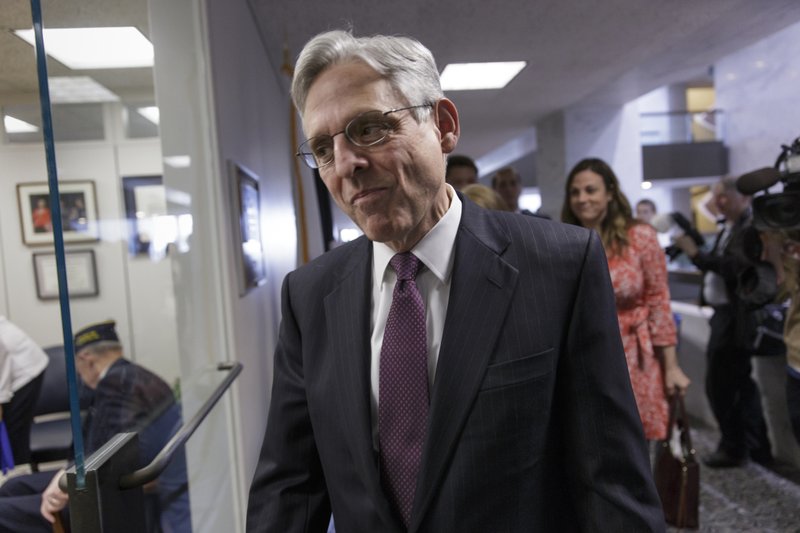WASHINGTON -- The Supreme Court has existed with its full complement of nine justices for close to 150 years, no matter who occupied the White House. Now some Republican lawmakers suggest that they would be fine with just eight justices for four years more rather than have Hillary Clinton fill the court vacancy.
The court has operated with eight justices for the past eight months as Republicans controlling the Senate have blocked confirmation hearings for President Barack Obama's nominee Merrick Garland.
Majority Leader Mitch McConnell, R-Ky., and his GOP colleagues have insisted that American voters should have a say in who is the next justice by choosing the next president in Tuesday's election. The 45th president -- either Democrat Hillary Clinton or Republican Donald Trump -- would fill the vacancy created when Justice Antonin Scalia died in February.
But several Republicans have said if the voters elect Clinton, they'll block her court nominees, essentially abandoning their advice and consent role for her entire term.
[INTERACTIVE: Major Supreme Court decisions in 2015-16 term]
"If Hillary Clinton becomes president, I am going to do everything I can do to make sure four years from now, we still got an opening on the Supreme Court," U.S. Sen. Richard Burr of North Carolina said in an audio recording of his meeting Saturday with GOP volunteers. CNN obtained a copy of the audio.
Fellow GOP Sens. John McCain of Arizona and Ted Cruz of Texas also have suggested blocking any Clinton nominees. Sen. Rand Paul, R-Ky., said in a debate Monday night that he "can't imagine" voting for any Clinton nominee though he stopped short of vowing to block a pick from a Democratic president.
McConnell said simply that the next president will make the nomination to fill the current vacancy.
The size of the court is set by federal law and has changed over the years, but has been nine justices since 1869.
When vacancies arise, they usually are filled within months, if not weeks. But there have twice been stretches of more than two years where the court was one justice short. Another six vacancies lasted more than a year. The most recent was in 1969 and 1970, when Justice Abe Fortas resigned and the Senate rejected two of President Richard Nixon's nominees before confirming Justice Harry Blackmun.
McConnell hasn't flinched since announcing just hours after Scalia's death that the Senate would delay the court-filling process.
However, McConnell may come under pressure from some Republicans to move on the nomination before the end of the year if Clinton wins, because Garland is considered by some to be a more moderate pick and Clinton could choose someone more liberal.
Sen. Jeff Flake of Arizona has suggested a vote in the postelection, lame-duck session. But McConnell has shown no signs of changing his mind, and several Republicans are emphatic in saying no vote this year.
Democrats could circumvent a GOP blockade if they control the Senate, by changing the chamber's rules, even though that would be a controversial move. But a Republican-held Senate could deny Clinton the 60-vote margin needed to advance high-court picks on the floor.
The next president could have an unusual opportunity to shape the future of the high court for years to come. Several justices will be on retirement watch over the next four years. Ruth Bader Ginsburg is 83, Anthony Kennedy is 80 and Stephen Breyer is 78.
There's no constitutional requirement that the Senate confirm anyone. But blocking nominees for an entire presidential term would be unprecedented. The longest Supreme Court vacancy lasted 835 days in the 1840s, according to the Congressional Research Service.
Other Republicans -- even those who aren't supporting Trump, like Rep. Joe Heck, who is running in Nevada for a Senate seat, or Sen. Pat Toomey in Pennsylvania -- have been using the Supreme Court to court conservative voters, although they at least say they would consider Clinton's picks.
Under the existing rules, the president would need 60 votes to overcome a filibuster of any Supreme Court picks.
Democratic Sen. Amy Klobuchar of Minnesota said in an interview Tuesday that she didn't think Republicans would actually carry out the Burr strategy of obstruction.
"I don't think that's shared by most Republican senators," she said, predicting that the Scalia vacancy would be filled by the first part of next year.
Several prominent Republicans are resisting the idea of a total blockade, including Judiciary Chairman Charles Grassley of Iowa.
Grassley said last week that he would hold confirmation hearings on a nominee whoever wins the presidency. Asked about the court operating with eight justices, Grassley said, "Now that would be contrary to what I've said for seven months."
Conservative Mike Lee of Utah and Orrin Hatch of Utah, the chamber's longest-serving Republican, also have resisted the idea of a blockade, as reported by The Salt Lake Tribune.
"Of course we will look at anyone who might be nominated by the next president," Lee said, according to the newspaper. "Whether that nominee will be confirmed is an entirely different question -- one that can't be answered in the abstract."
Information for this article was contributed by Mary Clare Jalonick of The Associated Press; and by Steven T. Dennis and Sahil Kapur of Bloomberg News.
A Section on 11/03/2016
